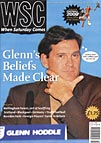 “I’m hoping to be shown where I am meant to be going, and what I’m meant to be doing. Perhaps it won’t be what I want. But it will be what I need.” Glenn Hoddle in The 1998 World Cup Story
“I’m hoping to be shown where I am meant to be going, and what I’m meant to be doing. Perhaps it won’t be what I want. But it will be what I need.” Glenn Hoddle in The 1998 World Cup Story
So, off he goes to no one's surprise. Some of the most successful managers in British football, including Bill Shankly, Don Revie and Brian Clough, might be politely described as eccentrics, so the fact that the man who picked the England team holds opinions seemingly derived from the witchhunts of the middle ages need not necessarily have made his position untenable.
The fact that it has become so is partly due to Hoddle’s own gormlessness and arrogance (never a good combination), but more to the increasingly fevered atmosphere that attends football stories these days. Hoddle’s final press conference, where dozens of journalists swarmed around to hear him say precisely nothing of substance, could hardly have been bettered as a symbol of the current climate.
In truth, the whole fiasco has not revealed much that wasn’t already known. This is borne out by Hoddle’s limp defence against the barrage of criticism over his interview in the Times. First he claimed his comments were “misconstrued”, then they were “misinterpreted”, finally, and triumphantly, he decided that he had not even said “them things” that he was quoted as saying. As just about the least articulate public figure in the country, he is never likely to be able to explain himself convincingly. Glenn’s words are often as mysterious to him as they are to his audience.
That is scarcely a crime in itself . But Hoddle repeated a mistake often made by celebrities in assuming that his views on subjects outside his own field are of interest to anyone. Whatever he may now claim to the contrary, he hardly had to be tricked into burbling on about his spiritual side. If anything, he seemed to seize every possible opportunity to enlighten the public about the ragbag of superstitions that constitute his personal beliefs.
Part of the problem is that it has taken so long for an appreciation of Hoddle’s real personality to supersede the image he had as a player. In football’s absurd world, the fact that he was an elegant passer of a ball, particularly one who had spent some time abroad, gave him an air of sophistication that has only recently fallen away.
It took his World Cup diary, in which he banged on about his conviction that he has a special gift bestowed on him by God, to turn the tide. (The Almighty, you would think, might have expected more from His chosen one than two FA Cup winner’s medals and a French championship, but maybe He is less fussy these days.)
Yet if Hoddle’s beliefs are ridiculous and in parts offensive, which they are, others have also played their part in bringing them to such prominence. The FA, for example. After all, the World Cup book was ghosted, or at least transcribed off a tape, by the man who has now announced Hoddle’s departure, David Davies.
He escaped censure for his involvement in the book and does not appear to have reined in any of the wackier aspects of Glenn’s credo, even though he must have thought some of it was barking. Perhaps the thrill of basking in the reflected glory of the England team (such as it is) was enough to make him suspend his critical faculties.
And the media, of course, have been quick to savage Hoddle, even (in fact, especially) those papers like the Daily Mail who routinely take advantage of their readers’ gullibility by peddling their own “spiritual” nonsense such as feng shui and astrology. Hoddle is wrong in thinking they were responsible for getting him the sack, but as usual their claim to the moral high ground rings exceptionally hollow.
True, Hoddle’s stock has been sliding since the World Cup and England’s subsequent poor performances, so anything that presents him in a negative light (and there is no shortage of examples) was bound to find a receptive audience. There would still have been a furore kicked up about his strange ramblings had England won the World Cup, or been comfortably on their way to Euro 2000, but you can bet there would not have been wholesale calls for his resignation.
The most extraordinary aspect of the coverage, however, has been its sheer quantity. It’s a sign of the grotesquely inflated importance attached to football these days that this story should have occupied the front pages of the newspapers for four days solid, with the understandable anger of disabled groups placed alongside the witterings of self-publicising buffoons like Tommy Docherty and David Mellor.
Among all the verbiage, perhaps the most apt comment came from a member of Britain’s cerebral palsy football squad. “Hoddle does have some strange ideas,” he said, “not least in how he picks his teams.”
Which is about the size of it. The man’s a pillock and he hasn’t done his job very well. But that hardly makes him unique in English football.
From WSC 145 March 1999. What was happening this month